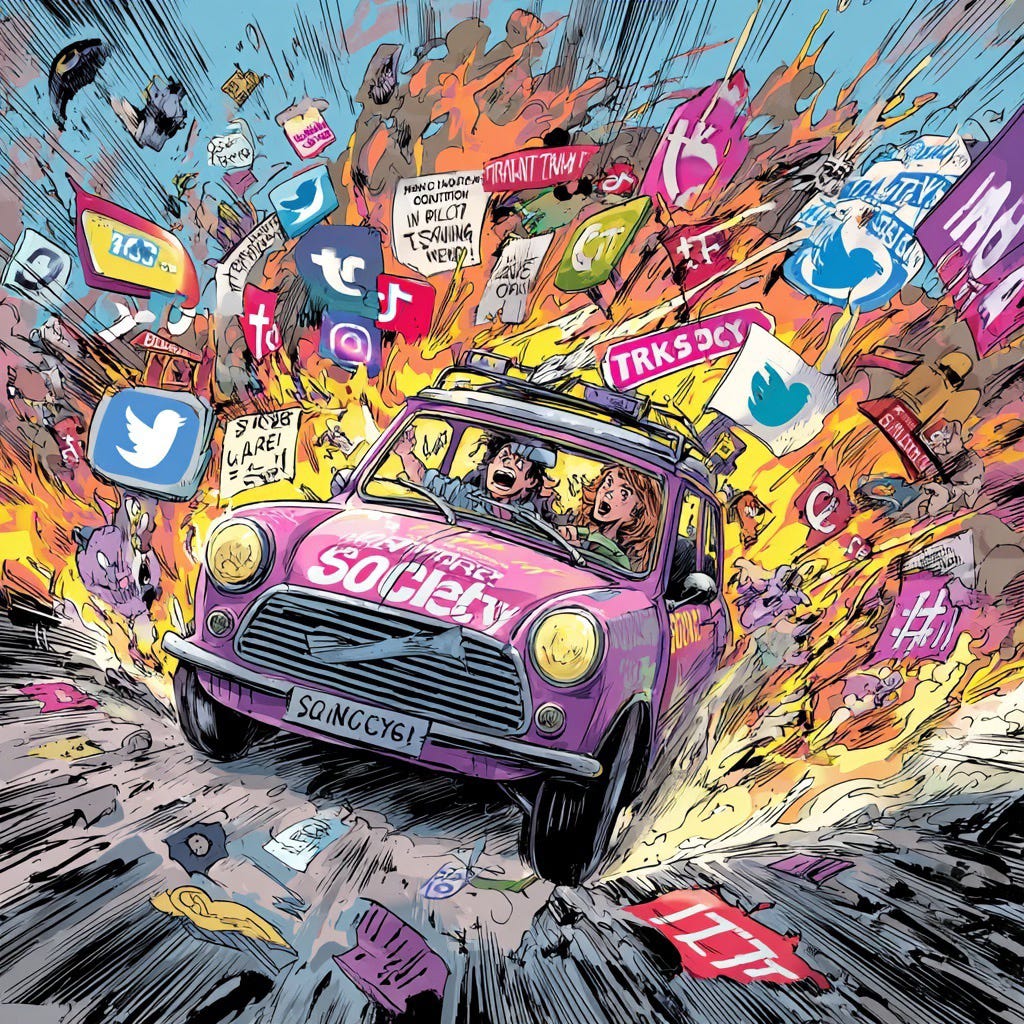Cultural Fishtailing, Why Everything Feels Like It's Out of Control
Our culture isn’t drifting. It’s overcorrecting, spinning out, and accelerating. The first step to restoring balance is recognizing the pattern.
Diogenes In Exile is reader-supported. Keep the lamp of truth burning by becoming a paying subscriber—or toss a few drachmas in the jar with a one-time or recurring donation. Cynics may live in barrels, but websites aren’t free!
Does anyone else feel like the world's gone mad? An incident happens, triggers a massive reaction, then a backlash, followed by another backlash. These wild swings can be provoked by leaked documents, a single murder, or one viral tweet from someone with enough followers.
This isn't just in our heads. We're caught in a pattern I call cultural fishtailing—and now that it has a name, maybe we can fix it.
Cultural Fishtailing, Explained
We've all been there. Driving maybe a little too fast when something appears—a dog in the road, a pothole, a landslide, you need to avoid. You jerk the steering wheel too hard, then have to overcorrect the other way. If you're lucky, you regain control and continue your trip. If not, the car flips.
Our culture is swerving just like that car.
Healthy systems make adjustments to fix problems and seize opportunities in increments large enough to create change but not so dramatic that people become unmoored. There are shifts, but they follow something like a sine wave that gradually smooths into stability.
In broken systems, these shifts amplify. Each reaction overcorrects the last, and instability escalates. That's cultural fishtailing: overreaction → backlash → bigger overreaction.
What makes this moment different from past upheavals? Where previous shocks brought people together—like the attacks on 9/11—the erosion of trust in core institutions means these dynamics now tear us apart rather than unite us.
When Systems Break, Chaos Escalates
Understanding cultural fishtailing requires thinking like systems theorists, because what's happening isn't just social or political—it's structural.
In healthy systems, change operates through feedback loops that maintain stability over time. Your body sweats when temperature rises. Ecosystems balance predator and prey populations. In culture, traditions, norms, and reform movements serve as informal regulators.
This balance is called homeostasis—a concept from physiology that cybernetics pioneer Norbert Wiener and anthropologist Gregory Bateson expanded to describe how entire systems maintain order.
But feedback only works when signals are accurate and responses are proportional.
When signals become distorted or responses overshoot problems, systems don't stabilize—they spiral. Corrections become overcorrections. Tensions escalate rather than ease. The regulatory loop breaks, and noise amplifies.
That's our current cultural moment. Our institutions and public discourse no longer regulate us toward balance. Instead, they act like amplifiers stuck on maximum volume, broadcasting panic, outrage, and identity confusion with no dampening mechanism in sight.
The Technology Accelerant
Any new technology impacts its culture by creating previously unavailable choices and interactions. This is especially true for technologies that connect us to each other and information faster and more uniformly.
Digital technology has made corruption and self-interested behavior much harder to hide. The widespread ability to fake previously trustworthy evidence—photos, videos, documents—adds another layer of confusion. Our information-vetting institutions, media and research, proved as corrupt as anyone else. All these factors add fuel to the fire.
Even without these complications, the internet flattened context while social media facilitated responding without reflection. We no longer process cultural inputs slowly and locally—we react instantly and globally, often before verifying facts.
The result isn't progress. It's cultural whiplash.
Fishtailing in Real Life
Looking back over the last decade, the pattern emerges clearly:
DEI: George Floyd's murder → riots and cancellations → opposition, firings, and legal challenges → deeper polarization
Public Health: COVID restrictions → exceptions for protests, corruption exposed → institutional distrust
Free Speech: Cancel culture rises → Twitter becomes X → users flee to Bluesky → discourse fragments into silos
Mental Health: Identity-focused therapy → events viewed through trauma lens → increased social conflict → calls for "decolonization"
These causes and events intertwine in complex ways, but the rapid shifts and escalating polarization are unmistakable. It's a testament to the strength of our constitutional foundations and basic cooperative instincts we haven’t folded into complete breakdown.
Panic at the Speed of Light
Cultural fishtailing isn't happening in isolation—it's supercharged by the very tools built to connect and inform us.
History shows that communication revolutions don't just evolve societies; they convulse them. The printing press unleashed 150 years of religious warfare across Europe. Radio and television enabled mass manipulation from fascist regimes to moral panics.
But even those technologies seem quaint compared to our current moment. Today, a local school board dispute or poorly worded tweet can escalate into national crisis within hours. Traditional gatekeepers vanished. Emotional contagion moves faster than truth. Feedback loops that once relied on time, deliberation, and proximity have been replaced with real-time judgment delivered to millions by algorithmic outrage engines.
Technology didn't create our dysfunction, but it accelerated and amplified it beyond our cultural capacity to cope. We live in a system where velocity masquerades as insight and emotional reaction poses as moral clarity.
How to Stop the Ride
Most people are exhausted by this struggle. Many have stopped watching news and avoid volatile corners of the internet. While this might seem like mere annoyance, history shows such large shifts can turn dangerous.
Here's what we can do from our own backyards, and if we work together:
Slow Down: Question information before sharing it. Resist the urge for immediate reaction. Create space between trigger and response.
Demand Institutional Transparency: Require conflict-of-interest disclosures for researchers, journalists, and officials. Mandate real-time publication of funding sources. This isn't ideological—it's basic accountability.
Rebuild Individual Trust: Reach out to friends you haven't contacted in ages. Make overdue apologies. Join local community efforts. Practice conversations about shared values before tackling disagreements. Learn to navigate conflict constructively.
Add Technology Safety Features: Just as we label food ingredients, we can label information sources. AI can provide echo chamber alerts and fact-checking warnings before you share inflammatory content. We can build AI systems that detect manipulated media even when humans cannot.
Create Economic Pressure Valves: Much social tension stems from economic anxiety. Make individuals direct consumers of health insurance and benefits to reduce institutional corruption. Control inflation to encourage saving. Prioritize financial literacy so people understand their options and limitations.
Remove Artificial Barriers: Bad laws and gatekeeping systems burden young people with debt when they could be starting families and businesses. Sunset outdated regulations. Enable customer and client review systems that break up institutional monopolies.
Encourage Innovation: Build new things. Take risks. Develop hiring practices that identify skills and character without wasting years of people's lives. Remember: many Founding Fathers were in their twenties. Human potential hasn't changed.
Restore Civic Literacy: Fixing institutions—or dismantling dysfunctional ones—requires legislation and political compromise. Not understanding this process is like handing your savings to strangers and asking them to manage it. Politics and government cannot deliver utopian ideals, and it's our responsibility to prevent them from trying.
Accept Necessary Change: Transformation is painful even when needed or desired. Avoiding discomfort often prolongs the process and increases suffering. For each person, there comes a point where the only way out is through. Accepting this reality can ease the journey.
Hold Steady or Spiral Out
If you've been feeling like nothing seems stable anymore, like you don't recognize the world you're living in, you're not alone. We've undergone massive changes while standing on the cusp of AI technology that promises to rewrite every rule.
The safeguards against tyranny aren't self-enforcing. If we want to preserve them, we cannot keep overreacting. We must steady ourselves before the next curve throws us off completely.
The choice is ours: hold steady through the turbulence, or let the fishtailing spin us into complete breakdown. The wheel is still in our hands for the moment.
Help Keep This Conversation Going!
Share this post on social media–it costs nothing but helps a lot.
Want more perks? Subscribe to get full access to the article archive.
Become a Paid Subscriber to get video and chatroom access.
Support from readers like you keeps this project alive!
Diogenes in Exile is reader-supported. If you find value in this work, please consider becoming a pledging/paid subscriber, donating to my GiveSendgo, or buying Thought Criminal merch. I’m putting everything on the line to bring this to you because I think it is just that important, but if you can, I need your help to keep this mission alive.
Already a Premium subscriber? Share your thoughts in the chat room.
About
Diogenes in Exile began after I returned to grad school to pursue a master’s degree in Clinical Mental Health Counseling at the University of Tennessee. What I found instead was a program saturated in Critical Theories ideology—where my Buddhist practice was treated as invalidating and where dissent from the prevailing orthodoxy was met with hostility. After witnessing how this ideology undermined both ethics and the foundations of good clinical practice, I made the difficult decision to walk away.
Since then, I’ve dedicated myself to exposing the ideological capture of psychology, higher education, and related institutions. My investigative writing has appeared in Real Clear Education, Minding the Campus, and has been republished by the American Council of Trustees and Alumni. I also speak and consult on policy reform to help rebuild public trust in once-respected professions.
Occasionally, I’m accused of being funny.
When I’m not writing or digging into documents, you’ll find me in the garden, making art, walking my dog, or guiding my kids toward adulthood.




